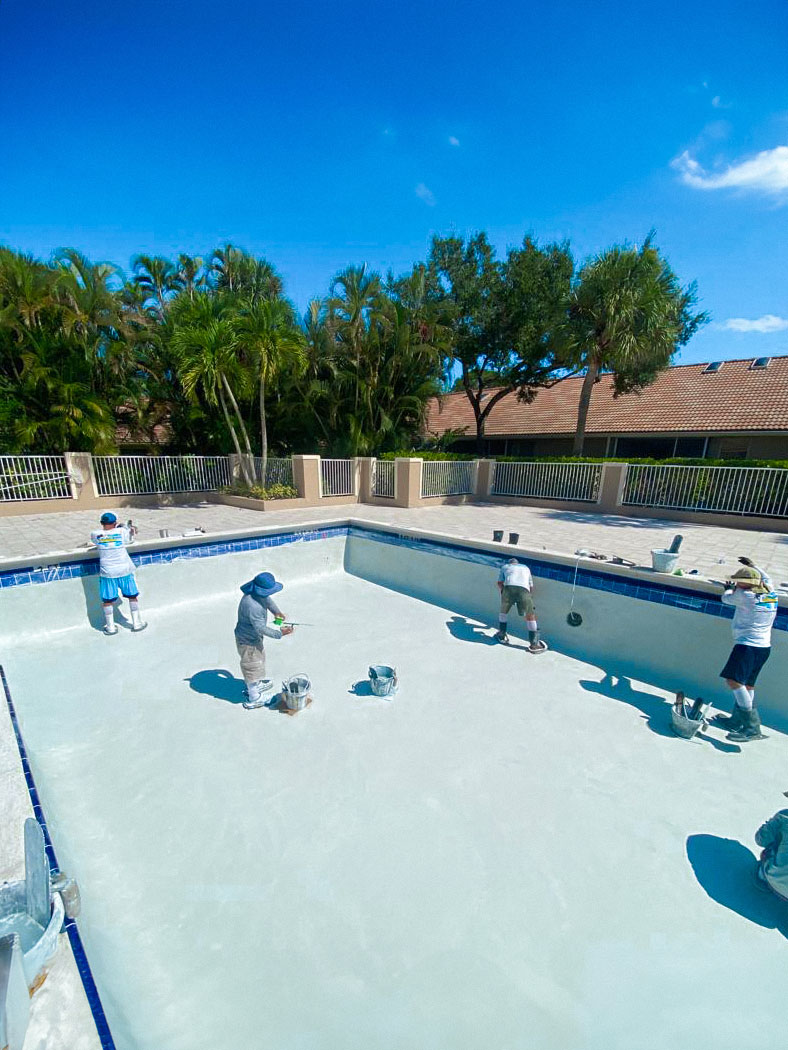Why Pool Resurfacing in Parkland Is More Than Just Cosmetic
In Parkland, Florida—a city known for its upscale homes, lush landscapes, and family-oriented communities—owning a pool is practically a given. But over time, even the most luxurious pools begin to show signs of wear. While many homeowners view pool resurfacing in Parkland as a purely aesthetic upgrade, the truth is that it goes far beyond looks.
Resurfacing your pool is a critical maintenance step that protects your investment, enhances safety, improves efficiency, and extends the life of your pool. In this article, we’ll explore the deeper reasons why resurfacing is essential and how it can transform your pool into a safer, more enjoyable, and more valuable feature of your home.
Understanding What Pool Resurfacing Really Is
Pool resurfacing involves removing the existing interior finish of your pool—typically plaster, quartz, or pebble—and applying a new surface layer. This process restores the pool’s appearance, but more importantly, it addresses structural integrity, water retention, and swimmer comfort.
In Parkland’s climate, where pools are exposed to intense sun, heavy rain, and frequent use, resurfacing is not just a luxury—it’s a necessity every 10 to 15 years, depending on the materials used and maintenance habits.
Safety First: Avoiding Injuries and Hazards
As pool surfaces age, they become rough, pitted, and uneven. This not only affects comfort but also increases the risk of cuts, scrapes, and slips—especially for children and elderly swimmers.
Common safety concerns include:
- Sharp or abrasive surfaces
- Loose or missing tiles
- Cracks that can cut feet or snag swimsuits
- Algae growth in porous areas, making surfaces slippery
By resurfacing your pool, you restore a smooth, safe surface that reduces the risk of injuries and creates a more enjoyable swimming experience for everyone.
Preventing Structural Damage and Water Loss
Small cracks in your pool’s surface may seem harmless at first, but they can quickly lead to more serious issues. Water can seep through these cracks and erode the underlying structure or surrounding soil, leading to:
- Foundation damage
- Pool shell instability
- Deck shifting or cracking
- Increased water bills due to leaks
In Parkland, where soil conditions and weather fluctuations can exacerbate these problems, resurfacing your pool at the first signs of wear is a proactive way to avoid costly structural repairs.
Improving Water Quality and Chemical Efficiency
An aging pool surface becomes more porous over time, which allows algae, bacteria, and debris to cling to the walls and floor. This makes cleaning more difficult and increases your reliance on chemicals to maintain water clarity and safety.
Resurfacing your pool with a modern, non-porous finish:
- Reduces algae growth
- Improves water circulation
- Enhances filtration efficiency
- Lowers chemical usage and costs
For Parkland homeowners who value clean, clear water and minimal maintenance, resurfacing is a smart, long-term solution.
Enhancing Energy Efficiency
You might not immediately associate resurfacing with energy savings, but the connection is real. A smooth, clean surface allows for better water flow and reduces strain on your pump and filter systems. This means:
- Lower energy consumption
- Extended equipment lifespan
- Reduced maintenance frequency
When combined with energy-efficient upgrades like variable-speed pumps or automated systems, resurfacing becomes part of a broader strategy to lower your pool’s operating costs.
Boosting Property Value and Curb Appeal
In a high-end market like Parkland, where buyers expect premium outdoor amenities, a dated or damaged pool can hurt your home’s resale potential. On the other hand, a freshly resurfaced pool with modern finishes and clean lines can:
- Increase perceived value
- Improve listing photos and showings
- Set your property apart from others
- Justify a higher asking price
Whether you’re planning to sell or simply want to enjoy your home to the fullest, resurfacing your pool is a worthwhile investment in both beauty and value.
Frequently Asked Questions
How do I know if my pool in Parkland needs resurfacing?
Signs include rough texture, discoloration, cracks, stains that won’t come out, or frequent algae growth. If your pool is over 10 years old, it’s likely due for resurfacing.
What’s the best surface finish for Parkland’s climate?
Quartz and pebble finishes are ideal for South Florida. They offer durability, resistance to staining, and a long lifespan—perfect for Parkland’s year-round pool use.
How long does the resurfacing process take?
Most projects take 1 to 2 weeks, depending on the size of the pool and the condition of the existing surface. Weather and custom features may affect the timeline.
Protect Your Investment with a Smart Renovation
Resurfacing your pool isn’t just about making it look better—it’s about protecting your investment, ensuring safety, and optimizing performance. In Parkland, where your pool is a central part of your home’s lifestyle and value, resurfacing is a smart, proactive step that delivers lasting benefits.
At Ocean Pools, we specialize in pool resurfacing in Parkland, offering premium materials, expert craftsmanship, and a fully in-house team that delivers results with precision and care. Whether your pool needs a basic refresh or a full transformation, we’re here to help you bring it back to life.
- Call now for a free consultation: (561) 258-9037
- Email: info@orchid-cod-915722.hostingersite.com
- Website: www.orchid-cod-915722.hostingersite.com
